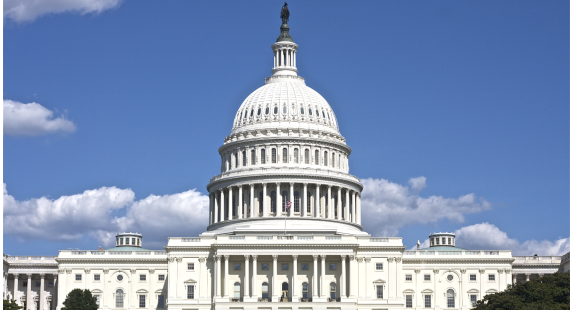You will receive power when the Holy Spirit comes on you; and you will be my witnesses in Jerusalem, and in all Judea and Samaria, and to the ends of the earth. — Acts 1:8
On the afternoon of Wednesday, January 6, I was in the last minutes of my all-staff meeting when I heard the news of trouble at the Capitol building in Washington, D.C. I think we will all remember where we were when we saw this unprecedented assault on this historic site. My schedule was full that afternoon and evening, including work meetings and an initial football practice as assistant coach for a group of teens from our church and community, so I felt behind when I finally got home and began to catch up with the event coverage from the different news networks.
That afternoon, rally-attenders-turned-rioters, with the intent of disrupting the democratic process, advanced through numerous levels of security and stormed the Capitol building. Video showed the crowds scaling walls, breaking windows and unlawfully entering and roaming throughout the building, including the Senate chamber. Members of Congress had to be rushed to safety and proceedings to confirm Joe Biden as president were suspended until order could be restored.
I worked quickly to form my few hours of viewing into an initial statement condemning the rioters’ actions, commending the actions of some for restoring order and calling Converge to pray for this situation, our country and the church.
Over the weekend, we were informed that five individuals lost their lives as a result of this melee. But, I propose we lost so much more.
As the leader of the multi-cultural movement that is Converge, which now numbers almost 1500 congregations — over one-third of which are non-white or non-English speaking— I’ve learned the value of seeking wisdom from the wide range of perspectives, voices and life experiences from pastors within our movement. Over the last several days, I have had numerous conversations with leaders who love God and embrace biblical truth (as well as democracy). Each of these leaders faithfully executes our mission and seeks a path forward that, despite our cultural, political and theological differences as a movement, demonstrates our belief that we are truly better together. These interactions have led to my broadened understanding of how that day’s events were perceived, processed and projected into responses.
Among those perspectives, three significant observations stand out:
First, no one should miss the significance of the moment or location of this event. It occurred at the moment most precious to our democratic process: the orderly transfer of power. It also occurred at the seat/citadel of our democracy — the United States Capitol building, where Congress has completed the electoral vote process for more than 200 years.
Members from both parties, Democratic and Republican, recognized and condemned this assault on our nation’s foundation. And while some of the crowd had proclaimed that they were simply caught up in the moment, there is no question of the intention of many to disrupt our democratic process. It was sedition. It was an attempt at insurrection.
Second, in addition to the timing and location of this event, the crowd’s allegiances were on display for the world to see. Movements are often identified by their symbols, and in this case, a way to identify the vitriolic fervor for causes rooted in the hearts of these rioters.
Among banners proclaiming their affection and allegiance to America were banners supporting our president. But there were also confederate flags and even a noose— which, to our African American citizens, are painful reminders of 400 years of mistreatment and misunderstanding engrained in their mental heritage.
The most disturbing part of the incident for me was the presence of the symbol of the cross and signs that said, “Jesus saves.” My heart grieves over the present disgraceful association of Christians with nationalism, white supremacy and racism. We cannot escape the impact of the connection of our values to those groups, recognizing that it tarnishes our witness, obliterates our influence and taints the name of God.
That association is an affront to the gospel over which the church should grieve. This creates for us a significant challenge of re-defining the true church in the minds of unbelievers in our communities. It forces us to realize that we must return the church to its primary calling and character. We are in a critical moment in history as the American church and we must rise to challenges put before us.
Finally, the scenarios of that day reminded us all that leadership matters, words matter and character matters. Leaders are followed as models of action and attitude. Leaders are cultural architects—their words create worlds. They form attitudes, values and beliefs that result in behaviors. And regardless of their gifts, abilities, understanding or expertise, leaders must embrace this principle: no amount of competency can ever make up for a fatal flaw in character.
Every leader must take responsibility for their words and ways, understanding that their actions ripple in and through the lives of their followers. When followers’ behaviors go astray, leaders must look in the mirror and make the critical adjustments. Leaders recognize that their model matters and that their sin splashes. Leaders, therefore, carry significant responsibility for the actions of their followers.
The events of last Wednesday were not disconnected, random or coincidental. They were directly connected to the words and ways of our president and, in the mind of many, were a predictable result of his deficiencies.
As believers, we understand from Scripture that power and influence are stewardships given by God. Power and influence, whether from position or platform, must be used for God’s glory. Leadership is a sacred responsibility and those entrusted with it must assure that their character advances Kingdom purposes.
Jesus is our ultimate model as a leader. Scripture says that he used his power, “not to be served, but to serve” (Mk. 10:45). Christian leadership takes the posture of a sacrificial servant. It is the responsibility of leaders who proclaim faith in Christ, whether in the church, community or country, to think and lead like Jesus, properly use these stewarded powers, live in holiness and point others to righteousness. In addition, we have also seen numerous times in scripture that when those stewarded powers are not used for God’s honor, it is not beyond God to remove that person from leadership. The church must take this into account.
In light of these insights and observations, as a follow up to my original statement on January 7, 2021, I now humbly with conviction, make the following statements. I realize these are my opinions and not everyone will agree with everything that I present. Yet, I sense the need to call the church to take notice of what is happening to our witness and to believe, think and act differently, courageously and respectfully as we move into a new season as a country.
A call to the church
I condemn the actions of the rioters on January 6 as seditious and insurrectionists’ attacks on our democracy. While I uphold every citizen’s right to protest, I condemn the use of violence, the wanton destruction of property and the endangerment of life as a means to be noticed or heard. Those actions are improper and unacceptable behavior in this and every other case of protest especially for those who name the name of Christ as Savior.
I condemn racism in all its forms. I reject white supremacy and plead with all of us to embrace the biblical teaching of the inherent value and equality of every person.
I warn against all attempts to merge our identity in the Christian faith with devotion to our country, a political party or a politician, a posture sometimes referred to as Christian nationalism. Our ultimate identity and hope is in Jesus Christ and nothing/no one more. While I encourage Christians to be involved in politics, I warn against valuing political agendas at the same level of our biblical responsibilities to reach and disciple the nations. I call those who have been caught up in this competing priority to re-establish their identity in Christ apart from political alliances. I encourage churches to do the same or risk future irrelevance by compromising the moral authority of Christian leaders and the church in the coming years.
I acknowledge the responsibility of leaders to lead with truth, integrity and grace. I humbly call on our president to acknowledge responsibility in encouraging — if not inciting — the crowd to action resulting in this riot last Wednesday. I pray he will recognize the stewardship of his power and condemn racism in all its forms, including white supremacy.
I call the church to pray for our nation and our new president and vice president. I call for prayer for the leaders of Congress, the Supreme Court, governors, state representatives, community leaders, pastors and other leaders in accordance with Romans 13 and 1 Timothy 2. I ask each of us to wrestle with what it means to honor the law and the authorities that God has put in place and to follow the wisdom of scripture in these matters.
I call every person in Converge to examine their hearts and rid themselves of any allegiance that rivals the primacy of God in their affections. I call on us to live lives of grace and truth, conviction and compassion, integrity and engagement with our community. The Bible commands us to love God with our whole hearts.
I call all Christians to uphold their biblical responsibilities in society including protecting the poor and oppressed, showing compassion to the foreigner and sojourner, protecting life from the womb to the tomb and uphold the sanctity of marriage between one man and one woman. We are to do these things in a discerning way, full of grace and truth. I call the people of God to search their hearts and repent of any tendency to put our political leanings above our biblical calling. I challenge the people of God to engage our communities not only with gospel words but with gospel actions: to figure out what it truly means to be a neighbor, a peacemaker and a reconciler.
I call the people of God to live a life marked by compassion, kindness, humility, gentleness and patience, especially among those with whom that have disagreement. I call every person to model a life of forbearance and forgiveness, just as Christ did with us. And beyond all these things, to put on love which binds them all together in perfect unity (Col. 3:12-14).
I call the churches of Converge to approach differences of political opinion within our congregations from a posture of humility and to seek unity, not division; to insert trust, not suspicion; and dispense grace, not rejection. I call every attender of a Converge church to reject the present cancel culture that sees relationships as disposable. Rather every person must stay at the table of fellowship, rally around our common beliefs, engage in our common mission and appreciate each other’s differences. I call the church to pray for God to heal the wounds of this last season and to help us move forward as one.
I call all of us to acknowledge the spiritual battlegrounds on which the church exists right now. Our battle is not against flesh and blood. No one wins if the church falls apart. No one wins if we allow secondary differences to get in the way of our primary call. We are truly better together.
The transfer of real power
Next week, President-elect Joe Biden and Vice President-elect Kamala Harris will be sworn in on the same Capitol grounds that rioters overran on January 6th. As our nation experiences this historic transition in power, I am reminded of another power conversation that happened 2000 years ago.
Jesus has been brutalized, buried and brought back to life. As he met with his disciples, they questioned him about whether this was the moment that power would be restored to Israel. Even Jesus’ closest followers, who had walked with him for years, misread his intention in the hope that he would establish a geo-political nation.
Instead of granting them political power, Jesus gave them something much more powerful — the power of his presence in their lives. This power was not to be used to promote a personal ideology or political party. It was not to be used to retain personal rights or comforts. This power was to be used to reach the nations of the world. This is our calling in Christ.
May God unite us through the power of his Spirit and the wisdom of his word to be about his business and bring about his kingdom reign in our lives, circles of influence, community, country and cosmos.
Better Together,
Scott



